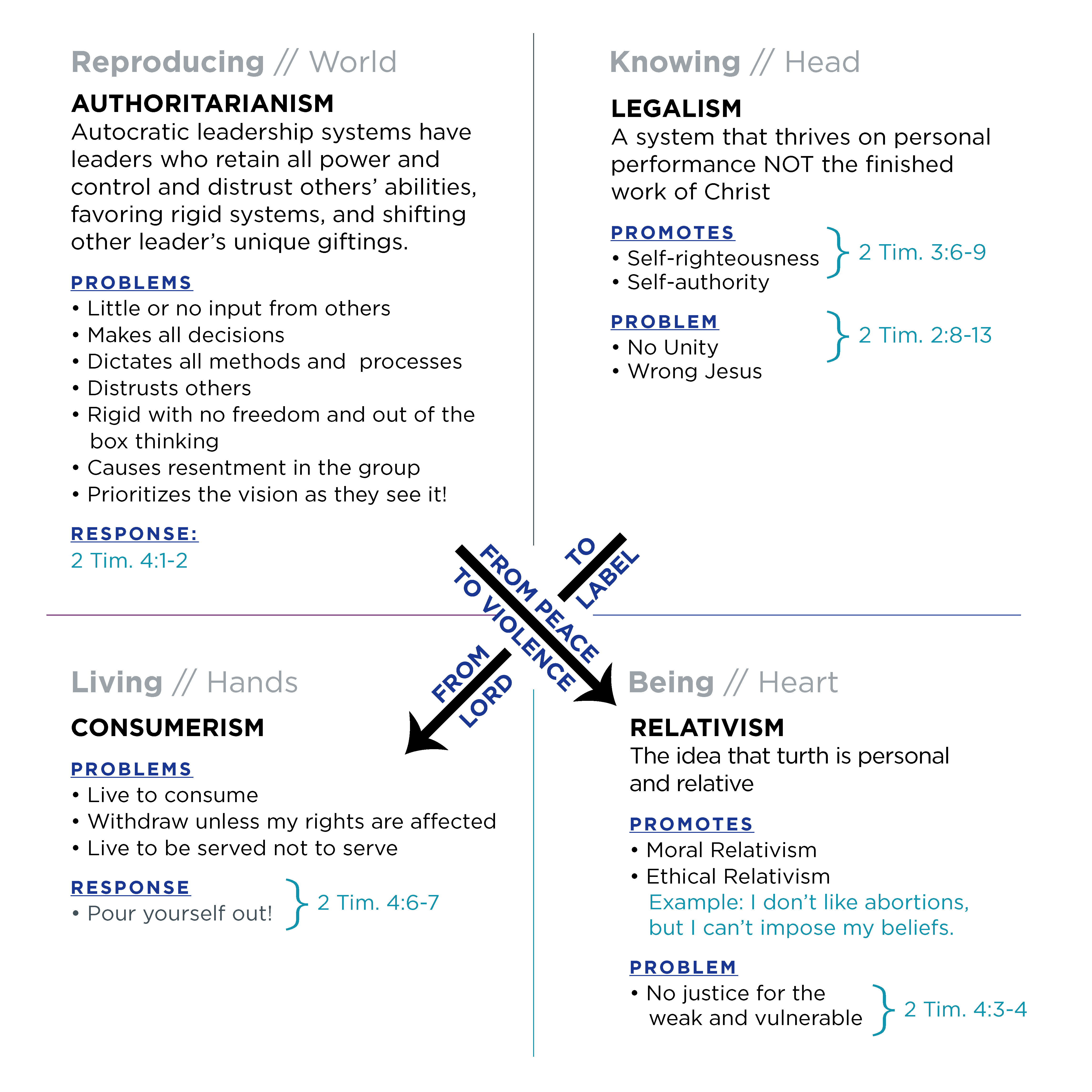Virtual Reality | Day 25
Reproducing
Christian leaders lay themselves down in service of others in accordance with God’s plans to spread the good news (2 Timothy 2:2)
When virtues go wrong, when the mind and heart harden to the work of the Spirit, leaders fall foul to the temptations to legalism, relativism, consumerism, and authoritarianism. Today I’m turning to the fourth and final segment of our two-by-two matrix addressing the idea of reproduction.

Consider some of the “habits” that belong to the virtue of “reproducing.”
1. Leaders are committed to sharing the good news of Jesus to others (1:8,11), when it is welcomed and even when it is not (4:2).
2. Leaders are charged with identifying new leaders, passing the same truth along to them (2:2), and reproducing Christ in them by drawing on the examples of others (2:3-7).
3. Leaders take every opportunity to pass along their knowledge (4:1).
4. Leaders encourage, rebuke, warn and challenge others to continue being both faithful and fruitful (4:9-18)
Consider what would happen if a leader sought to reproduce other leaders so that their vision of the world could be outworked rather than the vision of Christ?
Consider what would happen if a leader ministered not so much with the authority that comes from the Gospel but in a domineering, harsh and controlling manner?
These actions are the behavior of authoritarian leaders not leaders who act with the authority that comes from the Gospel. There is a difference. Authoritarian leadership systems have leaders who retain all power and control, looked down on those who question them, distrust others’ abilities, stifle other leaders’’ critiques and frequently keep gifted leaders down because they pose a threat.
The obvious problems with such behavior is well documented by Thom Rainer in a blog outlining traits of the worst kind of church leaders. Among the fourteen traits that relate to our study are the following twelve:
1. They rarely demonstrate the fruit of the Spirit.
2. They expect behavior of others they don’t expect of themselves. “Do as I say, not as I do.”
3. They see almost everyone else as inferior to themselves. You will hear them criticizing other leaders while building themselves up.
4. They show favoritism. It is clear that they have a favored few while they marginalize the rest.
5. They have frequent anger outbursts. This behavior takes place when they don’t get their way.
6. They say one thing to some people, but different things to others. This is a soft way of saying they lie.
7. They seek to dismiss or marginalize people before they attempt to develop them. People are means to their ends; they see them as projects, not God’s people who need mentoring and developing.
8. They are manipulative. Their most common tactic is using partial truths to get their way.
9. They lack transparency. Autocratic leaders are rarely transparent. If they get caught abusing their power, they may have to forfeit it.
10. They do not allow for pushback or disagreement. When someone does disagree, he or she becomes the victim of the leader’s anger and marginalization.
11. They surround themselves with sycophants. Their inner circle thus often includes close friends and family members, as well as a host of “yes people.”
12. They are self-absorbed. In fact, they would unlikely see themselves in any of these symptoms.
We’ve previously highlighted Paul’s encouragement for Timothy to rebuke in humility and love. We can supplement that corrective with the words recorded in 2 Timothy 4:1-2:
In the presence of God and of Christ Jesus, who will judge the living and the dead, and in view of his appearing and his kingdom, I give you this charge: Preach the word; be prepared in season and out of season; correct, rebuke and encourage—with great patience and careful instruction.
Paul not only encourages Timothy to preach the word but “charges” him to do it. The word charge is a technical term for taking an oath or a term for judgment in a law court. The use of “I” continues the personal nature of the Epistle as well as the apostolic authority which Paul holds. Commenting on the significance of this instruction, Knight writes,
Such preaching must be urgent and persistent, suited to the needs of people (“correct, rebuke and encourage,” better “exhort”), “with great patience and careful instruction.” Such urgent and persistent and patient preaching is necessitated by the opposition of people to such preaching because they have made themselves and their own desires the norm for what they will hear and want to hear (v3). They will even desert such preaching at times (v4). In the midst of such difficulties Timothy is given four commands in verse 5: (1) keep “calm and sane” (NEB); (2) be prepared to endure the difficulty of opposition; (3) keep working to evangelize; and (4) continue to do “all the duties of [his] ministry.” Such opposition demands more faithfulness to reach the opponents.
Paul has elsewhere instructed Timothy regarding false teachers. In chapter two Paul mentions Hymenaeus. Hymenaeus has already been dealt with by Paul:
Among them are Hymenaeus and Alexander, whom I have handed over to Satan to be taught not to blaspheme. 1 Timothy 1:20
Evidently the discipline of Hymenaeus hasn’t resulted in the man falling into the background or changing his tune. He’s still causing trouble. He’s an example of a leader acting in authoritarian ways in refusing to accept critique and correction. More than that he’s evidently continuing to espouse ideas contrary to the Gospel Paul preached—namely that the resurrection has already happened.
In that same chapter Paul instructs Timothy with these words:
What you have heard from me in the presence of many witnesses entrust to faithful men who will be able to teach others also. 2 Timothy 2:2
The principle Paul advocates is multiplication through reproduction based upon the truth of the Gospel.
Tomorrow I will continue to unpack this reproducing virtue…
‘til then…
Food for Thought:
1. Looking at Rainer’s twelve traits, which do you think are the ones you battle with the most?
2. Which do you think are the most prevalent?


Leave a Comment